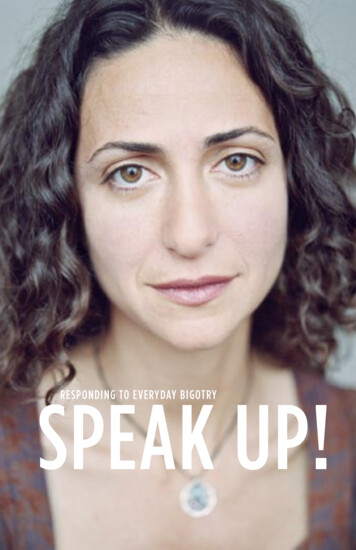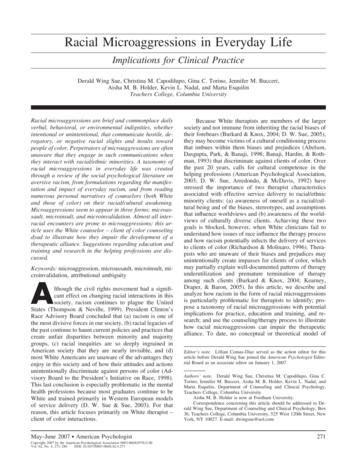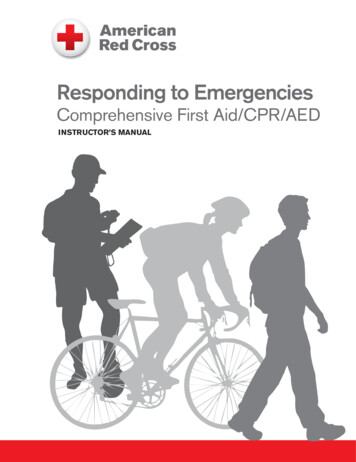
Transcription
SPEAK UP!RESPONDING TO EVERYDAY BIGOTRY
SPEAK UP!
SPEAK UP!INTRODUCTION4WHAT CAN I DO AT WORK?37WHAT CAN I DO AMONG FAMILY?9What Can I Do About Casual Comments? 40What Can I Do About Retail Racism?71What Can I Do About Sibling Slurs?12What Can I Do About Workplace Humor? 41What Can I Do About Racial Profiling?72What Can I Do About Joking’ In-Laws?13What can I do about sexist remarks?What Can I Do About My Own Bias?7542What Can I Do About Impressionable Children? 15What Can I Do About Meeting Missteps? 44What Can I Do About Parental Attitudes? 16What Can I Do About The Boss Bias?46What Can I Do About Stubborn Relatives? 17What Can I Do About My Own Bias?47What Can I Do About My Own Bias?WHAT CAN I DO AT SCHOOL?5119WHAT CAN I DO AMONG FRIENDS ANDNEIGHBORS?23What Can I Do About Sour Social Events? 26What Can I Do About Casual Comments? 27What Can I Do About Offended Guests?29What can I do about Real-estate racism?31What Can I Do About Unwanted Email?32What Can I Do About My Own Bias?33What Can I Do About Negative Remarks? 54What Can I Do About Familial Exclusion? 55What Can I Do About Biased Bullying?57What Can I Do About In-Group Bigotry? 58What Can I Do About A Teacher’s Bias?59WHAT CAN I DO IN PUBLIC?63What Can I Do About Biased Customer Service? 66What Can I Do About Bigoted Corporate Policy? 67What Can I Do About A Stranger’s Remarks? 68SIX STEPS TO SPEAKING UP AGAINSTEVERYDAY BIGOTRY77THE SPEAK UP! PLEDGE81SPEAK UP! AS A CAMPAIGN83SPEAK UP! AS A TRAINING TOOL85ACKNOWLEDGMENTS88RESOURCES89
RESPONDING TO EVERYDAY BIGOTRYYour brother routinely makes anti-Semitic comments. Your neighboruses the N-word in casual conversation. Your co-worker ribs you aboutyour Italian surname, asking if you’re in the mafia. Your classmate insultssomething by saying, “That’s so gay.”And you stand there, in silence, thinking, “What can I say in response tothat?” Or you laugh along, uncomfortably. Or, frustrated or angry, youwalk away without saying anything, thinking later, “I should have saidsomething.”No agency or organization counts or tracks these moments. They don’tqualify as hate crimes, and they rarely make news. That’s part of theirinsidious nature; they happen so often we simply accept them as part of life.Left unchecked, like litter or weeds, they blight the landscape.In the making of this book, the Southern Poverty Law Center gatheredhundreds of stories of everyday bigotry from people across the UnitedStates. They told their stories through email, personal interviews andat roundtable discussions in four cities: Baltimore, Md.; Columbia, S.C.;Phoenix, Ariz.; and Vancouver, Wash.‘I’M NOT WEIRD’Cody Downs, 30, has Down syndrome. He cannot read or write, but he liveson his own, enjoys music and worked as a disc jockey for many years.Cody and his mother, Kay Parks, were in the checkout line at the grocerystore. A woman in line behind them stared at Cody with a disgusted look onher face.Cody turned to his mother and asked, “Why is that woman looking weird at me?”Kay looked at the woman, then looked back to Cody.People spoke about encounters in stores and restaurants, on streets and inschools. They spoke about family, friends, classmates and co-workers. Theytold us what they did or didn’t say — and what they wished they did ordidn’t say.We present the stories here anecdotally, organized by the followingcategories: among family; among friends and neighbors; at work; at school;and in public. Yet no matter the location or relationship, the stories echoeach other.When a Native American man at one roundtable discussion spoke of feelingostracized at work, a Jewish woman nodded in support. When an AfricanAmerican woman told of daily indignities of racism at school, a whiteman leaned forward and asked what he could do to help. When an elderlylesbian spoke of finally feeling brave enough to wear a rainbow pin inpublic, those around the table applauded her courage.Stymied for an answer and wanting to provide Cody information he wouldunderstand, Kay said to her son, “Well, Cody, I guess she’s looking at youthat way because she thinks you’re weird.”Cody considered that for a moment.Then he turned to the woman behind him and said, “I’m not weird. I’m areally nice guy.”4 introductionintroduction 5
‘I HAD A FLIGHT RESPONSE’Leann Johnson, a multiethnic mother of two, made a Kwanzaa presentationat a public holiday gathering. Afterward, while Johnson was taking downthe display, a white woman came up and said, “When I first saw you, Ididn’t know you were black. You’re so smart and pretty.”“I had a flight response,” Johnson said. “I thought, ‘Something bad hashappened; just leave.’”So Johnson stepped away.Then, she said, “Something boiled up from deep inside, years of stuff, ofhearing those kinds of remarks. Plus I have two small children, two littlegirls, my babies, and I have a responsibility to them.”Speak up! calls on everyone to take astand against everyday bigotry.So Johnson turned, went back to the woman and said, “I don’t know if youknow how that sounded, but the way it sounded to me is that you thinkblack people cannot be smart or pretty.”The woman stammered, started to rationalize her comment, then stopped.Tears welled in her eyes as she said, “Thank you so much. I have reallylearned something today. I had no idea how that came out, and what yousay makes me understand it better.”Johnson said such moments are rare, but vital.“It is so important to have at least one win once in a while, one thank you.It makes it that much easier to step out next time, to take a risk and saysomething.”A NOTE TO THE READERAll stories presented in Speak Up! are real; due to personal preference andprivacy concerns, we present them anonymously. In situations where peopleshared similar stories, we developed an amalgam, drawing from more thanone person. Quoted material is drawn from personal interviews, roundtablediscussions, email, letters and some news accounts. Racial, ethnic and otherdescriptors are those used by the people telling their own stories.6 introductionintroduction 7
WHAT CAN I DO AMONG FAMILY?8 what can i do among family?what can i do among family? 9
Among participants in our roundtable discussions, family momentsrepresented some of the greatest difficulties: How to speak up to the peopleclosest to you, those you love the most, whether in response to a singleinstance or an ongoing pattern.Power and history — spanning generations — come into play in suchmoments, affecting how comfortable or unsettling it feels to speak up.Who holds power in the family? Who sets the tone for family interaction?What roles do elders and children play, and how might their words carrymore weight or impact? Would your uncle hear a complaint against hisbigoted “jokes” more deeply if it came from his 7-year-old niece? Or wouldGrandpa’s quiet grace be the stronger voice against bigotry?And other questions take shape: Was bigotry a part of daily life in the homeyou grew up in? Do you continue to accept that as the norm? Do you forgivebigotry in some family members more than others? Do the “rules” aboutwhat gets said — and what doesn’t — change from one home to another?Who shares your views opposing such bigotry? Working together, will youfind greater success in speaking out?Many people spoke of setting limits in their own homes, not allowing racist“jokes” or comments, even if they can’t control such moments in otherrelatives’ homes.Appealing to shared values can be a way to begin discussions at home orwith relatives. Try saying, “Our family is too important to let bigotry tearit apart.” Or, “Our family always has stood for fairness, and the commentsyou’re making are terribly unfair.” Or, simply, “Is this what our familystands for?”“I feel like an outsider. I feelconfused. Is this my family?”10 what can i do among family?what can i do among family? 11
WHAT CAN I DO ABOUT SIBLING SLURS?‘IS THIS MY FAMILY?’A woman is vacationing with her mother and two brothers. One morning,her brother says he wants to give his car “a Jewish car wash,” which hedescribes as “taking soap out when it’s raining to wash your car, so youdon’t waste money on water.” He says he learned the phrase from theirstepfather. She asks, “Why is that funny?” He laughs and says, “Don’t youget it? It’s the whole Jewish-cheap thing.” She responds, “Well, I don’tthink it’s funny.” He says, “What do you care? You’re not Jewish.”That evening, over dinner, her other brother makes similar remarks.“It pains me and embarrasses me that this is a pervasive culture in my ownfamily, that they consider this part of their ‘humor,’” she says. “I feel like anoutsider. I feel confused. Where have I been? Is this my family?”SPEAKING UPSibling relationships involve long-established habits, shared experiences andexpectations. In crafting a response to bias from a brother or sister, consideryour history together. Was bigoted language and “humor” allowed or evenencouraged in your childhood home? Or, is this behavior something new? Doesyou sibling see him- or herself as the sibling leader? Or does another siblinghold that role? The following suggestions might help frame your response:Honor the past. If such behavior wasn’t accepted in your growing-upyears, remind your sibling of your shared past: “I remember when we werekids, Mom went out of her way to make sure we embraced differences. I’mnot sure when or why that changed for you, but it hasn’t changed for me.”Change the present. If bigoted behavior was accepted in your childhoodhome, explain to your siblings that you’ve changed: “I know when we weregrowing up that we all used to tell ‘jokes’ about Jews. As an adult, though, Iadvocate respect for others.”Appeal to family ties. “I value our relationship so much, and we’ve alwaysbeen so close. Those anti-Semitic remarks are putting a lot of distancebetween us, and I don’t want to feel distanced from you.”Reach out. Feedback about bias is sometimes hard to hear. Who is yoursibling most likely to listen to? A spouse? A parent? A child? Seek out otherrelatives who can help deliver the message.12 what can i do among family?WHAT CAN I DO ABOUT JOKING’ IN-LAWS?‘NOT . IN MY OWN HOME’A woman’s father-in-law routinely tells racist “jokes” at family gatherings.“It made me very uncomfortable,” she writes, “though at first I didn’tsay anything to him about it.” After having children, however, she feltcompelled to speak up.Arriving for her next visit, she said to her father-in-law, “I know I can’tcontrol what you do in your own house. Your racist ‘jokes’ are offensiveto me, and I will not allow my children to be subjected to them. If youchoose to continue with them, I will take the children and leave. And I’minforming you that racist ‘jokes’ or comments will not be allowed in myown home.”SPEAKING UPFor many adults engaged in long-term partnerships there is no relationshipfraught with more anxiety than that with the in-laws. When two familieswhat can i do among family? 13
join together, creating common ground across familial cultures can bechallenging. When dealing with in-laws, keep the following in mind:Describe your family’s values. Your spouse’s family may well embracebigoted “humor” as part of familial culture. Explain why that isn’t the casein your home; explain that principles like tolerance and respect for othersguide your immediate family’s interactions and attitudes.Set limits. Although you may not be able to change your in-laws’ attitudes,you can set limits on their behavior in your own home: “I will not allowbigoted ‘jokes’ to be told in my home.”Follow through. In this case, during her next visit, the woman and her childrenleft when the father-in-law began to tell such a “joke.” She did that two moretimes, at later family gatherings, before her father-in-law finally refrained.WHAT CAN I DO ABOUT IMPRESSIONABLE CHILDREN?‘HOW WOULD HE FEEL?’µ A woman’s young son tells a racist “joke” at dinner that he had heard onthe playground earlier that day. “I immediately discussed with him howinappropriate it was. I asked him to put himself in the place of the person inthe ‘joke.’ How would he feel? I discussed with him the feeling of empathy.”µ A New Jersey woman writes: “My young daughter wrapped a towelaround her head and said she wanted to be a terrorist for Halloween — ‘likethat man down the street.’” The man is a Sikh who wears a turban forreligious reasons. The woman asks, “What do I tell my daughter?”SPEAKING UPChildren soak up stereotypes and bigotry from media, from familymembers, at school and on the playground. As a parent concerned aboutyour child’s cultural sensitivities, consider the following:Focus on empathy. When a child says or does something that reflectsbiases or embraces stereotypes, point it out: “What makes that ‘joke’funny?” Guide the conversation toward empathy and respect: “How do youthink our neighbor would feel if he heard you call him a terrorist?”Expand horizons. Look critically at how your child defines “normal.” Helpto expand the definition: “Our neighbor is a Sikh, not a terrorist. Let’s learnabout his religion.” Create opportunities for children to spend time with14 what can i do among family?what can i do among family? 15
and learn about people who are different from themselves.Prepare for the predictable. Every year, Halloween becomes a magnetfor stereotypes. Children and adults dress as “psychos” or “bums,”perpetuating biased representations of people with mental illness or peoplewho are homeless. Others wear masks steeped in stereotypical features ormisrepresentations. Seek costumes that don’t embrace stereotypes. Havefun on the holiday without turning it into an exercise in bigotry and bias.Be a role model. If parents treat people unfairly based on differences,children likely will repeat what they see. Be conscious of your own dealingswith others.WHAT CAN I DO ABOUT PARENTAL ATTITUDES?‘WHAT TO SAY’µ A woman writes: “My mother uses racial and ethnic terminology — theMexican checkout clerk, the black saleslady — in casual stories in whichrace and ethnicity are not factors. Of course, if the person is white, shenever bothers to mention it.”µ A man continually refers to the largest nuts in cans of mixed nuts as“nigger toes.” His grown children speak up whenever they hear him use theterm, but he persists.µ A man writes, “My father says he has nothing against homosexuals, butthey shouldn’t allow them to lead in a church. I didn’t know what to say.”SPEAKING UPothers the way I wanted to be treated. And I just don’t think that term isvery nice.”Discuss actively. Ask clarifying questions: “Why do you feel that way?”“Are you saying everyone should feel this way?” Articulate your view: “Youknow, Dad, I see this differently. Here’s why.” Strive for common ground:“What can we agree on here?”Learning how to have adult-to-adult dialogue is part of the maturationprocess for any child-parent relationship. As we grow older, we sometimesdevelop different views than those of our parents, guardians or childhoodcaregivers. Navigating such conflicts often is complicated by a commoncultural norm: respect your elders. How, then, can we cross these divides?Anticipate and rehearse. When you know bias is likely to arise, practicepossible responses in front of a mirror beforehand. Figure out what worksbest for you, what feels the most comfortable. Become confident in yourresponses, and use them.Speak up without “talking back.” Repeat information, removingunnecessary racial or ethnic descriptions: “What did the checkout clerk donext, Mom?” Or, “Yes, I like these mixed nuts, too.” Subtly model bias-freelanguage.WHAT CAN I DO ABOUT STUBBORN RELATIVES?Appeal to parental values. Call upon the principles that guided yourchildhood home. “Dad, when I was growing up, you taught me to treat16 what can i do among family?‘IT WAS LIKE A GAME TO HIM’µ A young Arizona woman says her father and uncle know how much sheopposes racist or homophobic “jokes.” “I’ve told them that all the time, andwhat can i do among family? 17
Describe how you are feeling. “I love you so much, and I know you loveme, too. I wonder why you choose to keep hurting me with your commentsand ‘jokes.’”Appeal to family ties. “Your ‘jokes’ are putting unnecessary distancebetween us; I worry they’ll end up doing irreparable harm. I want to makesure those ‘jokes’ don’t damage our relationship.”State values, set limits. “You know that respect and tolerance areimportant values in my life, and, while I understand that you have a right tosay what you want, I’m asking you to show a little more respect for me bynot telling these ‘jokes’ when I’m around.”Ask for a response. “I don’t want this rift to get worse, and I want us tohave a good relationship. What should we do?”Broaden the discussion. Consider including sympathetic family membersand not-so-sympathetic family members in the discussion so everyone canwork to help the family find common ground.Put it in writing. If spoken words and actions don’t have an effect,consider writing a note, letter or email. Often, people “hear” things moreclearly that way.they just keep telling ‘jokes’ to make me mad, to push my buttons and get areaction. They know I hate it. It used to make me so angry I’d cry and leavethe house. Now I just try not to react.”µ A Maryland man shares a similar story: “My cousin used to come visitme whenever he was doing business in town. One time he was over andused the N-word, and I said, ‘I don’t use that word,’ but he still used it afew more times. I finally said, ‘Don’t use that word. If you’re going to usethat word, I’m going to ask you to find somewhere else to stay.’ It was like agame to him, to use the word to see how I’d react.”SPEAKING UPSometimes people can be persistently manipulative when it comes tobigoted behavior, continuing “jokes” and comments simply to spark areaction from others. Try the following:Describe what is happening. Define the offense, and describe the patternof behavior. “Every time I come over, you tell ‘jokes’ I find offensive. Whilesome people might laugh along with you, I don’t. I’ve asked you not to tellthem, but you keep doing it anyway.”18 what can i do among family?WHAT CAN I DO ABOUT MY OWN BIAS?‘I THOUGHT I WAS COOL’An African American woman is raising her teenage niece. The niece joinedthe basketball team, came home and said, “Auntie, there are 12 girls on theteam, and six are lesbians.”The woman recalls the moment:“I thought I wasn’t homophobic, but, boy, I had to sleep on that one. I wasthinking, you know, they’re going to recruit her. And here I thought I wascool. It used to be my fear — and I hate to say this, but it’s true — it used tobe my fear that she would come home with a white man. Now I’m askingmyself, ‘Would I be more upset if she came home with a white man or ablack woman?’”SPEAKING UPConfronting our own biases is a good thing; that’s one of the ways we grow.This is not a comfortable process, but the practice of examining one’s ownwhat can i do among family? 19
prejudices is the first step toward diminishing or eliminating them. Hereare some steps to consider:Seek feedback and advice. Ask family members to help you work throughyour biases. Families that work through these difficult emotions in healthyways often are stronger for it.State your goals out loud. Say, “You know, I’ve really got some work todo here, to understand why I feel and think the way I do.” Such admissionscan be powerful in modeling behavior for others.Commit to learn more. Education, exposure and awareness are keyfactors in moving from prejudice to understanding and acceptance. Createsuch opportunities for yourself.Follow through. Select a date — a couple of weeks or months away — andmark it on a calendar. When the date arrives, reflect on what you’velearned, how your behavior has changed and what’s left to do. Reach outagain for feedback on your behavior.20 what can i do among family?what can i do among family? 21
WHAT CAN I DO AMONG FRIENDSAND NEIGHBORS?22 what can i do among friends and neighbors?what can i do among friends and neighbors? 23
many stories people shared with us dealt with difficult momentsinvolving friends and neighbors. Factors that affect how they speak upinclude how well or little they know each other, how often they interactand how damaging they consider the offense to be.Some people said they’re more forgiving of bigotry among friends than theyare among family or the general public, allowing remarks to pass withoutresponse. “Lisa’s just that way,” they say. “She’ll never change.” Thatbecomes an excuse for not speaking up. Do you allow such attitudes to keepyou from speaking up?Others indicated that what gets said within in-groups — people of thesame race, ethnicity, gender, sexual orientation or religion — often is morebigoted or biased than what they say or hear in the broader community. Doyou allow bigotry to go unfettered in such groups? What message does thatsend? And how does it relate to your values?“I felt like an idiot and didn’t evenhave the good sense to apologize,though I was at least smartenough to stop telling ‘jokes.’’’24 what can i do among friends and neighbors?what can i do among friends and neighbors? 25
WHAT CAN I DO ABOUT SOUR SOCIAL EVENTS?‘THAT CAN’T BEGOOD MANNERS’µ From a California man:“I grew up fairly poor, but I attended a college that drew students from some veryrich families. A wealthy classmate invited me out to dinner one night when herfamily was visiting, and we went to the fanciest restaurant I’d ever been to.“During the salad course, the waiter brought a cloth-covered platter withwhat I found out later were chilled forks. I reached to take the platter outof his hands so I could pass it around the table to the others. Apparently,judging from the laughter from my classmate’s sister and parents, this wasa major faux pas. I was supposed to just take my fork and let the waitermove to the next person with the tray.“I felt ashamed for the rest of the meal and excused myself from joiningthem for some sightseeing afterward. Heading back to my dorm room, Ijust kept thinking about them laughing at me. That can’t be good manners.”µ Others spoke of similar social-event moments, including being in groupswhere phrases such as “redneck” and “white trash” are used in “joking” butuncomfortable ways.SPEAKING UPSocial events provide us with opportunities to mix and mingle with peoplewho are different from us. They also are common environments for culturalmisunderstandings and biased “humor.”Address the speaker. A simple comment — “I’m sorry; what’s so funny?” —can jar someone from their rudeness. Or be more exact: “I’m sorry. I’m notsure I know what you mean by ‘white trash.’ Could you explain that term?”When faced with crafting an answer, the speaker may begin to understandthe inappropriateness of the remark.Appeal to the host. Party hosts have brought people together and oftenare the closest to each of the guests. Ask the host to rein in offensive “jokes”and culturally biased statements. In the above case, the man may havediscussed the moment later, with his classmate, who then could have raisedthe issue with her family.26 what can i do among friends and neighbors?Look for body language. Did you see anyone else flinch when thecomment was made? If so, approach the person and assess whether theyknow the speaker well. If so, consider asking that person to approach thespeaker privately.WHAT CAN I DO ABOUT CASUAL COMMENTS?‘WHAT DO CHINESEPEOPLE THINK?’µ A white man plans to marry a South American woman; his friends makeincorrect assumptions about her race, religion and family background.“The question we never stop getting is, ‘Do Carrie’s parents mind?’ Whenwe question the question, we are told that ‘Indian families’ like theirdaughters to marry their ‘own kind.’ How can we respond?”what can i do among friends and neighbors? 27
let protracted silence do the work for you. Say nothing and wait for thespeaker to respond with an open-ended question: “What’s up?” Thendescribe the comment from your point of view.Talk about differences. When we have friendships across group lines, it’snatural to focus on what we have in common, rather than our differences. Yetour differences matter. Strive to open up the conversation: “We’ve been friendsfor years, and I value our friendship very much. One thing we’ve never reallytalked about is my experiences with racism. I’d like to do that now.”WHAT CAN I DO ABOUT OFFENDED GUESTS?‘WHAT ARE YOU?’A friend stays overnight with a married couple. All three had been part ofa beer-drinking crowd in college but when offered a beer that evening, theguest politely declines.In the morning, the husband offers the guest a cup of coffee. Again, theguest declines. Attempting humor, the husband asks, “What are you,Mormon or something?”µ A Chicago woman who is adopted, still grieving the death of her mother,is told, “Oh, so that wasn’t your real mother who died?” The woman writes,“I was so hurt by this I didn’t know what to say.”µ A Chinese American woman often finds herself asked by friends, “Whatdo Chinese people think about that?”SPEAKING UPFriends are our comfort zones, where we let down our guards andcan simply be ourselves. Casual conversation is the mainstay of theserelationships. But when bias is interjected into everyday moments withfriends, relationships can feel markedly uncomfortable. How then can youreconnect?Approach friends as allies. When a friend makes a hurtful commentor poses an offensive question, it’s easy to shut down, put up walls ordisengage. Remember that you’re friends with this person for a reason;something special brought you together. Drawing on that bond, explainhow the comment offended you.Respond with silence. When a friend poses a question that feels hurtful,28 what can i do among friends and neighbors?The guest explains that, yes, he has married since college, to a Mormonwoman, and has converted.The wife describes it this way: “Ever the nice guy, (the guest) handled itwith grace and wit, letting (my husband) off gently.”SPEAKING UPWhen we open up our homes to people outside our families, we providemore than meals and guest rooms. We surround them with our habits, ourbeliefs and our traditions. Broaden your hospitality by understanding andrespecting the cultural needs and norms of your guest.Be proactive. Before houseguests arrive, ask if they have any specialdietary restrictions or other needs. Also, share any household traditions orpractices you have that may affect them.Pay attention. When we miss or ignore social cues and clues, wecan stumble into awkward moments. Pay attention to subtleties ofcommunication, a hesitancy from a guest before beginning a meal mightindicate a need for a moment of silent prayer, for example.Focus on behavior, not beliefs. If you feel the need to ask questions,what can i do among friends and neighbors? 29
center it on behavior rather than beliefs. “John, you used to drink in college.Have you stopped?” This may open, rather than close, a conversation.Accept information at face value. If someone declines one thing, offeranother without judgment or inference. “Would you like a soft drinkinstead?” Or, “We also have milk or juice; would that work?” Be gracious.Aim to please, not judge.Take responsibility. If you do stumble, don’t let someone else’sgraciousness take you off the hook. Make amends as quickly and sincerelyas possible: “What an insensitive thing for me to say. I’m sorry.”WHAT CAN I DO ABOUT REAL-ESTATE RACISM?‘WE DON’T SHAREYOUR VIEWS?’µ A New York couple meet their new neighbor shortly after he moves in.The new neighbor opens the conversation with, “You’re probably relievedthat no one black moved in.”µ An Oregon man’s neighbor informs him he has finally sold his housedescribing, in a disapproving voice, the buyer as “a Chinese or Japanesewoman married to a white man.”µ A South Carolina couple in an all-white neighborhood sell their home toan African American family. A neighbor confronts them angrily and askswhy they sold the house to black people.SPEAKING UPWhether friends or not, neighbors are people we interact with often — aswe take out the trash, bump into each other in the apartment complexhallway or walk by on the way to the bus stop. Sometimes casualconversations with our neighbors reveal biases. What can you do tointerrupt bias — and keep the peace at the same time? Try this:Assert neighborly values. “We know you’re new to the neighborhood.Around here, we welcome all kinds of people. And we all look out for eachother.”Appeal to basic humanity. When confronted with a bigoted, “Why did you30 what can i do among friends and neighbors?what can i do among friends and neighbors? 31
sell your house to those people?” a simple reply is, “Because they’re people.They want to buy our house, they can buy our house.”Appeal to allies or the neighborhood association. If you’re the targetof bigoted conduct and fear for your well-being or safety, let sympatheticneighbors know; ask them to keep an eye (and ear) out for you. Or contactthe neighborhood association, which may have policies in place to assist you.Model neighborly behavior. Extend a hearty welcome to new neighbors,and honor old neighbors. Help to create a neighborhood that valuesconnectedness, rather than exclusion and bias.WHAT CAN I DO ABOUT UNWANTED EMAIL?‘REPLY ALL’ TO BIGOTRYMany of us receive unwanted “joke” emails forwarded by friends orcolleagues.Lesbians and gays, Muslims, Catholics, Jews, people with disabilities,Republicans, Democrats, people of all races and ethnicities, blondes and peoplewho are overweight: The targets of such “joke” emails are innumerable.“It’s horrible,” writes one man, who says he has changed his email addressat least once and not given the new address to those friends who frequentlyforward such emails.SPEAKING UPPeople often forward emails without critical thought about its content, orthe people receiving it. And email provides a broad reach — with a cl
really nice guy.” RESPONDING TO EVERYDAY BIGOTRY Your brother routinely makes anti-Semitic comments. Your neighbor uses the N-word in casual conversation. Your co-worker ribs you about your Italian surname, asking if you’re in the mafia. You










